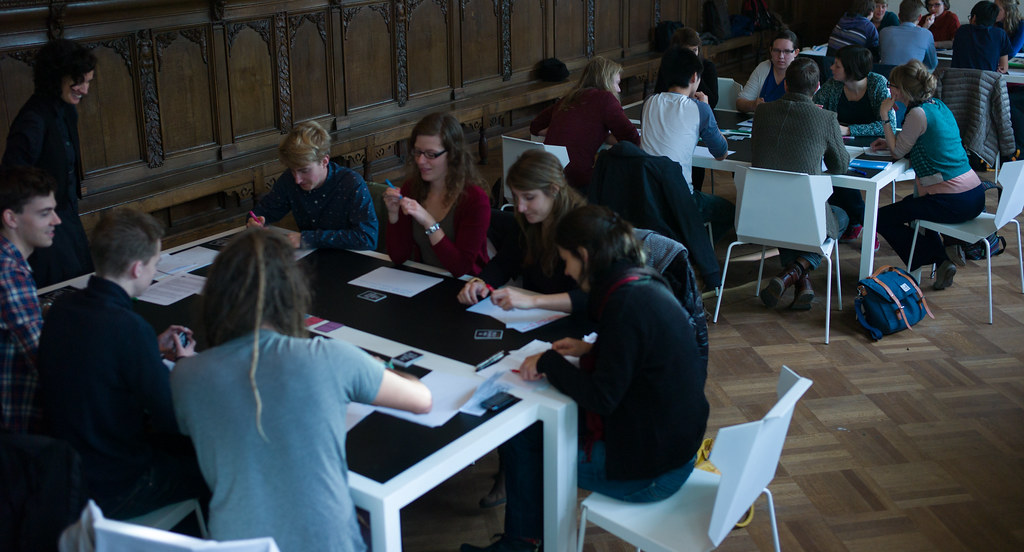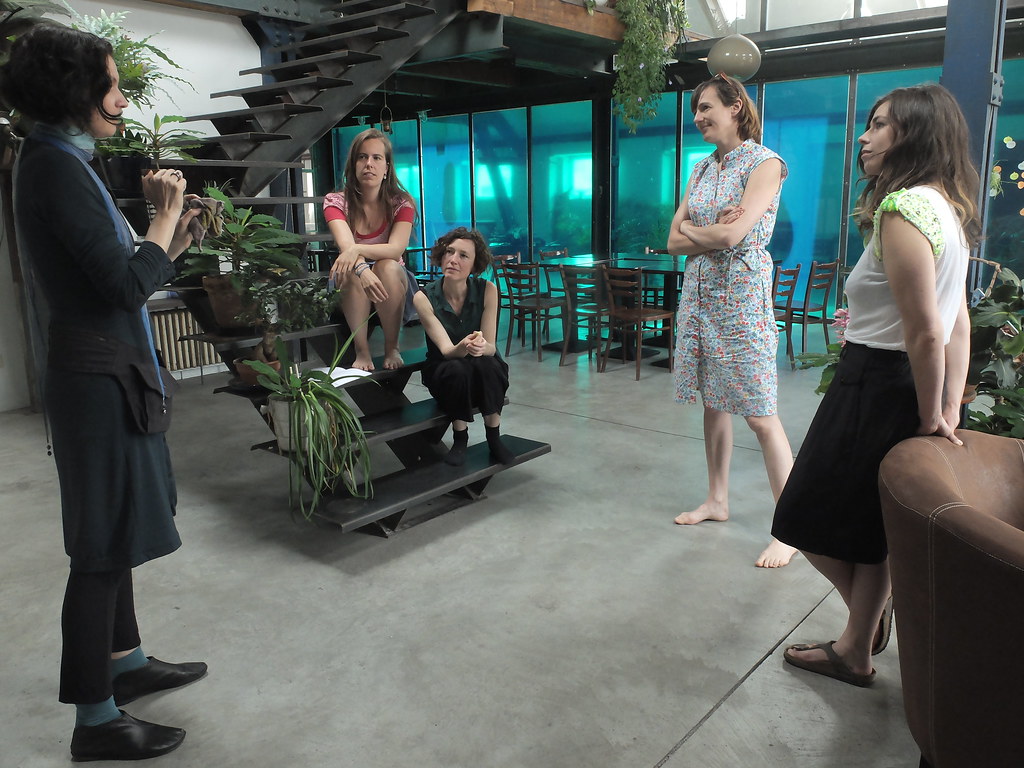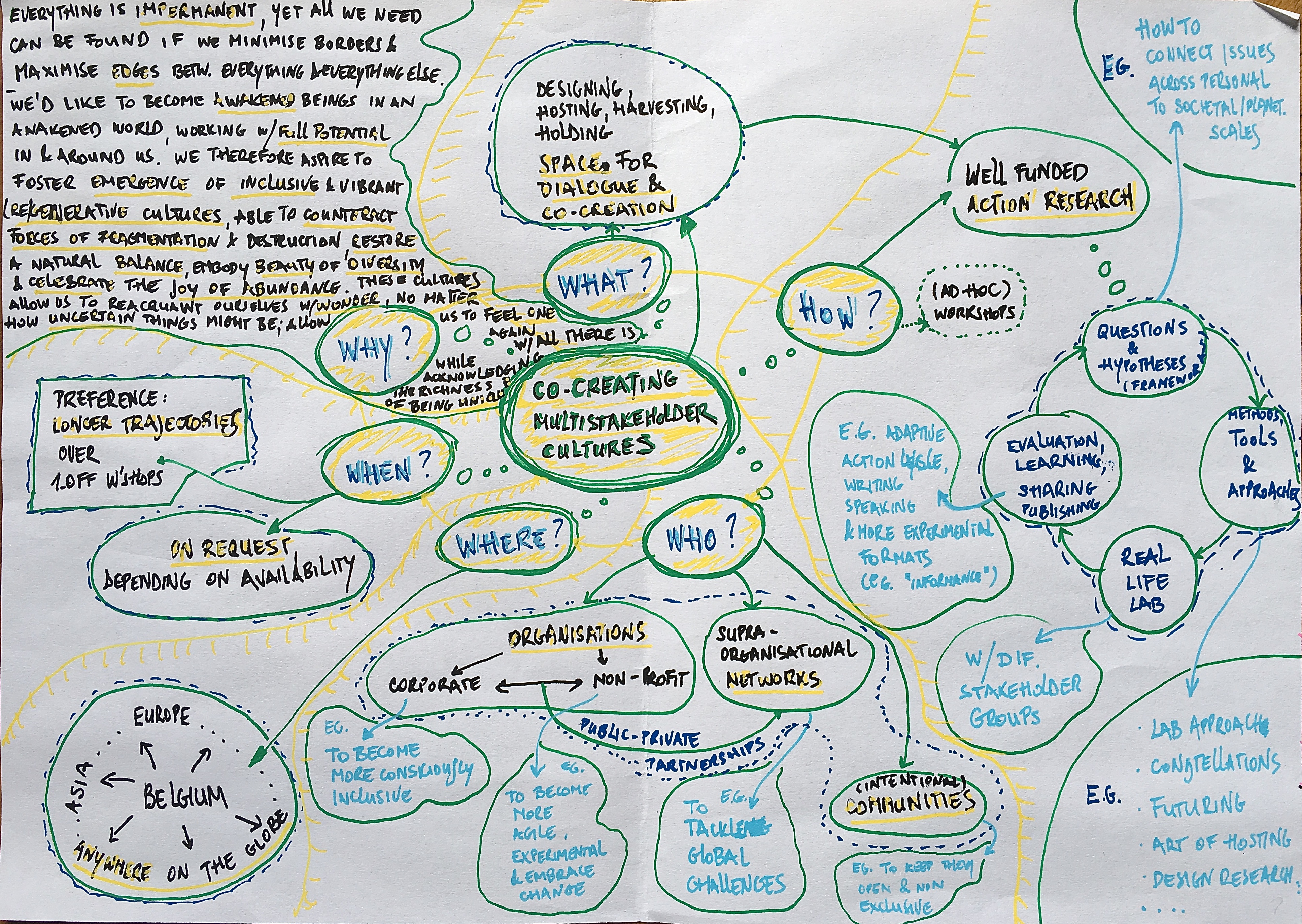This is an old revision of the document!
Table of Contents
Process Facilitation
What is it?
Process facilitation guides groups of people to effectively work together in participatory situations, such as workshops, meetings or collaborative projects.
Facilitators create space for dialogue and co-creation, using participatory processes as our craft. We research how to bring out the participants’ full potential in collective endeavours, in different contexts and for varying purposes. We design event flows to maximise engagement, creativity and learning. We facilitate collaborative situations and guide the groups towards meaningful outcomes. We record the conversations in text and (audio)visual media, thereby “harvesting” and synthesising the group’s collective insights. We support groups to translate their conversations into adaptive action and reflection. Our aim is to attend to the emergence of inclusive and innovative (organisational) cultures, while providing engaging and meaningful experiences for the individual participants.
While our individual members can facilitate processes in any context, organisation, sector or subject matter, as a group we have a few key areas of interest:
- Transition processes, especially connecting personal and systemic transitions
- Multistakeholder initiatives to address complex issues that cannot be resolved from a single discipline or worldview
- Unexpected alliances, beyond professional and social silos.
- Visioning, futurecrafting, strategic design and a pro-active engagement with the uncertainty of futures
- Integrating transdisciplinary approaches into experimental frameworks, including multiple ways of knowing and learning
- Contemplative and reflective practices in action-oriented pursuits.

Why?
We live in uncertain times that call for alternatives to the status quo. As Einstein said, “A new type of thinking is essential if mankind is to survive and move toward higher levels.” Yet, as in all uncertain times, we also see the rise of conservatism, xenophobia, sectorial entrenchment and other forces of destructive fragmentation. We believe that such tendencies can be counteracted by fostering emergence of diverse and inclusive cultures. Cultures able to invigorate and (re)generate the ecological and social systems they interact with. Cultures seeking to find a dynamic balance between seemingly opposing opinions, systems and world-views. Where rigid borders become fertile edges. Where individuals can deploy their full potential for the benefit of the collective well-being. Where each person can experience a sense of belonging to a larger whole, while also appreciate the richness of being unique.
Why process facilitation?
Most of our collaborative pursuits deal with issues that are complex, urgent and important. People involved tend to be pressed for time and resources. It is therefore crucial that the collaboration makes the most of everyone’s presence. Facilitating participatory processes enables individuals and groups to learn from each other, tackle problems from multiple perspectives and for multiple benefits.
In a facilitated process, much thought goes into designing the most appropriate ways to engage everyone in the group and guide them towards their stated aims. When a facilitator takes care of the “how” a conversation will take place, the participants can completely concentrate on “what” the conversation is about. They can focus on the issue at hand, knowing that there is someone who “holds the space” so that the group can move beyond individual differences and “business as usual”, towards what really matters. They are free to explore, trusting that someone is guiding them towards the aims they set for themselves.

How?
We custom design processes for clients and partners, as well as offer ready-made thematic programmes (e.g. inspirational dinners, workshops on living with dis-ease…). While we can facilitate one-off meetings, workshops and other types of gatherings, we aim to develop long-standing relationships, which allow us to contribute to substantial transformations and long-term impact.
Our process design evolves through continuous cycles including planning, experimentation and reflection, also known as the “action research cycle”. This approach works particularly well in longer-term initiatives with iterative cycles of development, allowing us to progressively adapt the process to the group and their needs.
A cycle begins by asking questions, finding gaps in our knowledge and learning what we need to know. It proceeds to a collaborative design and planning stage, which culminates in facilitating a process. As we custom-design every process, we see our work as a “real life lab”, where we test our designs with different groups and contexts. We complement the established facilitation methods (e.g. The World Cafe or Open Space) with more experimental “lab approaches”, combining techniques from the arts and sciences. We observe the process and adapt where needed. The cycle ends with documentation, evaluation and reflection, aiming to improve our practice with each iteration. We share what we learn using principles of Creative Commons.
Who?

Who are we?
Our process facilitators have diverse backgrounds, including the arts, science, engineering and community- and business development. The transdisciplinary nature of our group allows us to work across sectors, taking advantage of our complementary skills and knowledge. We find common ground in our experience with the creative process in collaborative settings, such as artist collectives, maker spaces, design studios and (social and technological) innovation labs.
Who do we work with/for?
Our clients and partners come from a range of sectors and professional contexts, looking to transform their work to become more inclusive, agile, creative and sustainable. For example:
- Organisations: businesses, corporations, non-profit institutions, governments, co-operatives, entrepreneurs…
- Networks: multistakeholder initiatives, public-private partnerships, supraorganisational networks…
- Communities: creative collectives, communities of practice, intentional communities, community centres…
Where?
The majority of our practitioners live in Belgium, with Europe as our usual operating sphere. Several of us are global nomads able to work anywhere where we’re called to.
When?
Depending on request and availability of facilitators. Long-term programmes take precedence over one-off commissions.
Some of us work based on seasonal programming, in which spring and autumn tend to be the best periods for process facilitation.
Needs
What does process facilitation need from the hosting community?
- Access to potential clients and networks
- Communication and promotion of facilitation services
- People to co-host processes (experienced hosts, assistants, logistics support, (graphic) recorders…)
- (Optional) Space and facilities to host participatory processes
Offers
Why is process facilitation relevant for the hosting community? What learning will it bring?
- Visibility of the community in diverse sectors and networks
- A toolbox of frameworks, methods, techniques and approaches
- A portfolio of realised work (good for promotion, visibility as well as learning)
- Possibly a good source of income
- Testbed for other hosting practices (e.g. guided meditations, rituals, vision quests and other contemplative practices)
Process Facilitation Working Group
What is it?
A working group and community of practice for process facilitators and team coaches.
Why?
- To support and learn from each other’s practices,
- To collaborate, experiment and co-create,
- To widen our professional networks,
- To broaden our skills and knowledge.

How?
Support for individual practitioners by offering co-hosting opportunities, peer-mentoring and access to wide international and transdisciplinary networks. The longer term aim is for the group to become a supportive peer-learning environment, including:
- Network where aspiring and established process facilitators can meet and initiate collaborations.
- Lab/Testing ground for experimental techniques
- Studio for co-creation of participatory processes
- Toolbox of practical techniques and methods
- Safe zone and support group for the practitioners to tackle professional challenges
- Living archive of (research) questions, conceptual frameworks and theoretical underpinnings.
Where?
In Belgium (Brussels, Ghent) and online.
When?
- Regular face-to-face gatherings (regularity TBD)
- Continuous access to a collaborative space online (mailing list, “toolbox”, documentation repository…)
- Bilateral sessions (mentoring, co-creation, co-hosting), as needed
Needs
What does this working group need from the hosting community?
- Committed members
- Co-ordination
- Joint funding opportunities for long-term, larger scale projects
- (Optional) Space and facilities to host working group gatherings
Offers
Why is this working group relevant for the hosting community? What learning will it bring?
- Support for individual members
- Proof of concept for the larger hosting community of practice
- Process facilitation is at the core of the hosting community, whatever we learn in this group would be likely be relevant for other work-streams
- Action research cycle is an example of how to implement continuous learning in a practical context
- Ability to initiate and participate in larger scale and longer term (research) projects
- Access to wider professional networks, promotion of all hosting community activities
More working notes: from the skype call on the 25th of skype_20160825

